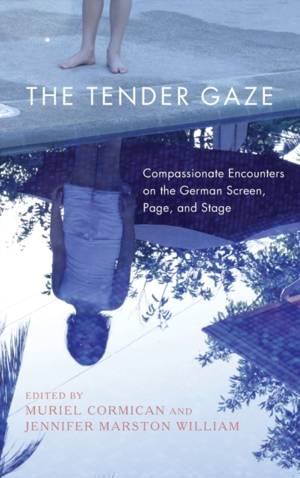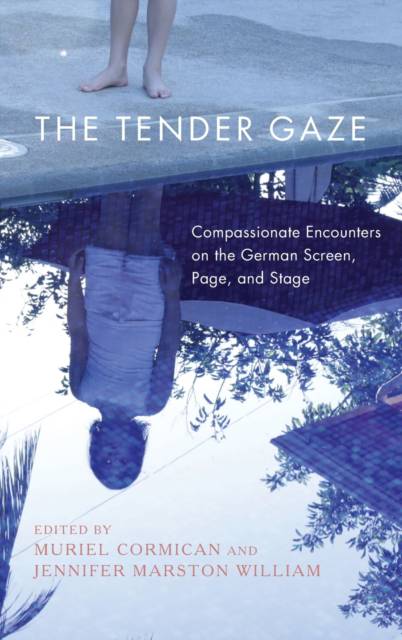
- Afhalen na 1 uur in een winkel met voorraad
- Gratis thuislevering in België vanaf € 30
- Ruim aanbod met 7 miljoen producten
- Afhalen na 1 uur in een winkel met voorraad
- Gratis thuislevering in België vanaf € 30
- Ruim aanbod met 7 miljoen producten
Zoeken
The Tender Gaze
Compassionate Encounters on the German Screen, Page, and Stage
€ 177,45
+ 354 punten
Omschrijving
The gaze, understood as a way of looking at others that involves contemplation and the operation of power, has an extensive history of iterations such as the male gaze (Mulvey), the oppositional gaze (hooks), and the postcolonial gaze (Said). This essay collection develops a supplemental theory of what Muriel Cormican has coined the "tender gaze" and traces its occurrence in German film, theater, and literature. More than qualifying the primarily voyeuristic, narcissistic, and sexist impetus of the male gaze, the tender gaze also allows for a differentiated understanding of the role identification plays in reception, and it highlights various means of eliciting a sociopolitical critique in works of art. Emphasizing the humanizing potential of the tender gaze, the contributors argue that far from simply exciting emotional contagion, affect in art promotes an altruistic, rational, and fundamentally ethical relationship to the other. The tender gaze elucidates how perspective-taking operates in art to foster empathy and prosocial behaviors. Though the contributors identify instances of the tender gaze in artistic production since the early nineteenth century, they focus on its pervasiveness in contemporary works, corresponding to twenty-first-century concerns with implicit bias and racism.
Muriel Cormican is Professor of German and Chair of Modern Language Studies at Texas Christian University. Jennifer Marston William is Professor of German and Head of the School of Languages and Cultures at Purdue University.
Muriel Cormican is Professor of German and Chair of Modern Language Studies at Texas Christian University. Jennifer Marston William is Professor of German and Head of the School of Languages and Cultures at Purdue University.
Specificaties
Betrokkenen
- Uitgeverij:
Inhoud
- Aantal bladzijden:
- 240
- Taal:
- Engels
- Reeks:
- Reeksnummer:
- nr. 5
Eigenschappen
- Productcode (EAN):
- 9781640140745
- Verschijningsdatum:
- 15/06/2021
- Uitvoering:
- Hardcover
- Formaat:
- Genaaid
- Afmetingen:
- 152 mm x 231 mm
- Gewicht:
- 498 g

Alleen bij Standaard Boekhandel
+ 354 punten op je klantenkaart van Standaard Boekhandel
Beoordelingen
We publiceren alleen reviews die voldoen aan de voorwaarden voor reviews. Bekijk onze voorwaarden voor reviews.







